

What are Cognitive Skills and Abilities? By: Dr.
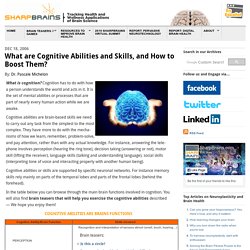
Pascale Michelon What is cognition? Cognition has to do with how a person understands the world and acts in it. It is the set of mental abilities or processes that are part of nearly every human action while we are awake. Cognitive abilities are brain-based skills we need to carry out any task from the simplest to the most complex. Cognitive abilities or skills are supported by specific neuronal networks. In the table below you can browse through the main brain functions involved in cognition. With age, some cognitive abilities tend to decline, especially the so-called executive functions,
(2) What Are Cognitive Skills and How Do They Work? - A BrainFit Resorts Production. What is Normal Cognitive Aging? iStock.com/PeopleImages Everyone experiences a “senior moment” as they get older.
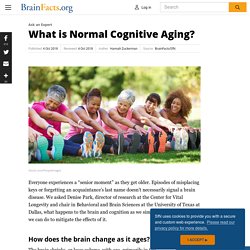
Episodes of misplacing keys or forgetting an acquaintance’s last name doesn’t necessarily signal a brain disease. We asked Denise Park, director of research at the Center for Vital Longevity and chair in Behavioral and Brain Sciences at the University of Texas at Dallas, what happens to the brain and cognition as we simply get older and what we can do to mitigate the effects of it. Cognitive Health and Older Adults. Cognitive health—the ability to clearly think, learn, and remember—is an important component of brain health.
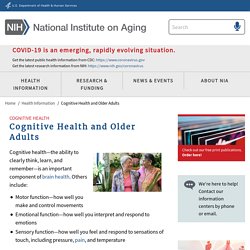
Others include: Motor function—how well you make and control movements Emotional function—how well you interpret and respond to emotions Sensory function—how well you feel and respond to sensations of touch, including pressure, pain, and temperature This guide focuses on cognitive health and what you can do to help maintain it.
The following steps can help you function every day and stay independent—and they have been linked to cognitive health, too. Take Care of Your Physical Health Taking care of your physical health may help your cognitive health. Get recommended health screenings. Eat Healthy Foods A healthy diet can help reduce the risk of many chronic diseases, such as heart disease or diabetes. In general, a healthy diet consists of fruits and vegetables; whole grains; lean meats, fish, and poultry; and low-fat or non-fat dairy products. How memory and thinking ability change with age.
Scientists used to think that brain connections developed at a rapid pace in the first few years of life, until you reached your mental peak in your early 20s.
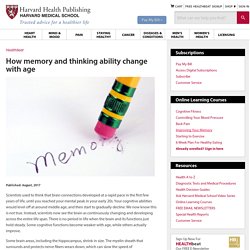
Your cognitive abilities would level off at around middle age, and then start to gradually decline. We now know this is not true. Instead, scientists now see the brain as continuously changing and developing across the entire life span. There is no period in life when the brain and its functions just hold steady. Some cognitive functions become weaker with age, while others actually improve. Some brain areas, including the hippocampus, shrink in size. On the other hand, the branching of dendrites increases, and connections between distant brain areas strengthen. Age is also the biggest risk factor for many brain diseases, most of which affect brain structure and function. As a result of these changes, you will likely start to notice slight slips in your memory in middle age and beyond. Attention Deficit Can Come with Old Age. Source: Are you old enough that this sounds familiar?
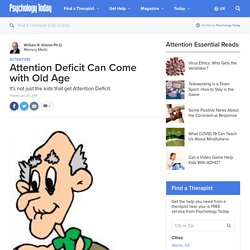
Actually, memory problems like these affect most people at some time, but getting older can make such forgetting worse. These memory problems happen because you lose attention and get distracted. As you get older, it is easier to get distracted. It is as if we get "attention deficit disorder (ADD)" as we age. article continues after advertisement A brain-scan study at the University of Toronto found that older people, compared to young adults, have decreased brain activity in brain areas that enable concentration This means that older brains can't focus well, because the parts of the brain that enable concentration don't get active enough.
To compound the problem, older people show increased activity in parts of the brain that don't normally get activated during memory tasks in younger people. Another study at the University of Illinois examined age-related increase in distractibility. Enough already! Focus, focus, focus. What Is Mild Cognitive Impairment? Some people with memory problems have a condition called mild cognitive impairment, or MCI.
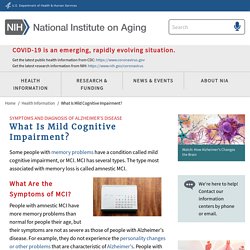
MCI has several types. The type most associated with memory loss is called amnestic MCI. What Are the Symptoms of MCI? People with amnestic MCI have more memory problems than normal for people their age, but their symptoms are not as severe as those of people with Alzheimer's disease. For example, they do not experience the personality changes or other problems that are characteristic of Alzheimer's. Signs of MCI include: Losing things often Forgetting to go to events or appointments Having more trouble coming up with words than other people of the same age. Memory loss & Alzhemimer's disease. Dementia.
2. Staying mentally active. 3. Staying socially active. Staying physically active. Staying mentally active. Staying socially active.